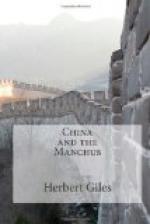On the death of the Emperor, a plot was concocted by eight members of the extreme anti-foreign party at Court, who claimed to have been appointed Regents, to make away with the Empress Dowager, the concubine mother, known as the Western Empress, of the five-year-old child just proclaimed under the title of Chi Hsiang (good omen), and also the late Emperor’s three brothers, thus securing to themselves complete control of the administration. Prince Kung, however, managed to be “first at the fire,” and in accordance with the Chinese proverb, was therefore “first with his cooking.” Having got wind of the scheme, in concert with the two Empresses Dowager, who had secured possession of the Emperor, he promptly caused the conspirators to be seized. Two of them, Imperial princes, were allowed to commit suicide, and the others were either executed or banished, while Prince Kung and the two Empresses formed a joint regency for the direction of public affairs, after changing the style of the reign from Chi Hsiang to T`ung Chih (united rule).
The position of these two Empresses was a curious one. The Empress Dowager par excellence—for there is only one legal wife in China—had no children; a concubine had provided the heir to the throne, and had in consequence been raised to the rank of Western Empress, subordinate only to the childless Eastern Empress. Of the latter, there is nothing to be said, except that she remained a cipher to the end of her life; of the concubine, a great deal has been said, much of which is untrue. Taken from an ordinary Manchu family into the palace, she soon gained an extraordinary influence over Hsien Feng, and began to make her voice heard in affairs of State. Always on the side of determined measures, she had counselled the Emperor to remain in Peking and face the barbarians; she is further believed to have urged the execution of Parkes and Loch, the order luckily arriving too late to be carried out. For the next three years the Regents looked anxiously for the final collapse of the T`ai-p`ings, having meanwhile to put up with the hateful presence of foreign diplomats, now firmly established within the Manchu section of the city of Peking. No sooner was the great rebellion entirely suppressed (1864), than another rising broke out. The Nien-fei, or Twist Rebels, said to have been so called because they wore as a badge turbans twisted with grease, were mounted banditti who, here to-day and gone to-morrow, for several years committed much havoc in the northern provinces of China, until finally suppressed by Tso Tsung-t`ang.




